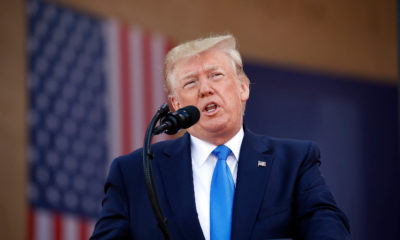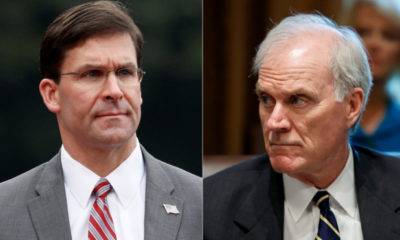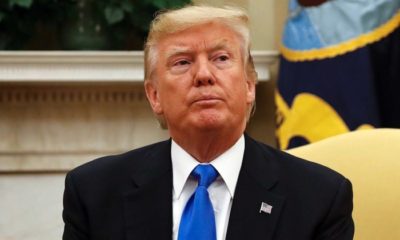World
Trump warns of riots if he is not Republican nominee

 Washington: Republican presidential front-runner Donald Trump and his closest rival Ted Cruz warned of dire consequences if the party establishment attempts to have a brokered convention to pick the Republican nominee.
Washington: Republican presidential front-runner Donald Trump and his closest rival Ted Cruz warned of dire consequences if the party establishment attempts to have a brokered convention to pick the Republican nominee.
“I think you’d have riots. I think you’d have riots,” Trump said on Wednesday after wins in Republican primaries in four states took his delegate count to 673 as against Cruz’s 411 and Ohio Governor John Kasich’s 143.
“I’m representing a tremendous many, many millions of people,” he said on CNN.
Kasich’s win in his home state on Tuesday deprived Trump of its 66 delegates and made it hard for the brash billionaire to reach the 1,237 delegates he needs to capture the Republican prize without a floor fight at the Cleveland, Ohio, convention in July.
With a contested convention likely to choose the party nominee, one of Trump’s supporters said there would be riots if Trump didn’t win the nomination at the convention, though riots themselves “aren’t necessarily a bad thing”.
“If it means because it’s in there fighting the fact that our establishment Republican party has gone corrupt and decided to ignore the voice of the people and ignore the process,” Trump supporter Scottie Neil Hughes told CNN.
Pressed specifically on the word “riot,” she said: “It’s not riot as in a negative thing like what we’ve seen in the past, it’s the fact that you have a large amount of people that will be very unhappy.
“I don’t think they would sit there and resort, in fact I know they would not resort to violence, I know they would not do it. However, they would make sure their voices are heard, that they can’t be ignored,” Hughes added.
Earlier on Wednesday, Cruz said party leaders getting behind a brokered convention would be disastrous.
“I think that would be an absolute disaster. I think the people would quite rightly revolt. The way to beat Donald Trump is at the ballot box,” the Texas senator said.
“If it ends up happening that we get to Cleveland and nobody has 1,237 delegates, that Donald has a whole bunch of delegates and I have a whole bunch of delegates and we come in neck-and-neck, then it is up to the delegates to decide,” he added.
Despite Kasich’s first win on Tuesday night, Cruz said it makes no sense for the Ohio governor to remain in the race.
“It is mathematically impossible for John Kasich to become the nominee. At this point, he had lost 20 states before Ohio,” Cruz said.
Republican National Committee Communications Director Sean Spicer said on Wednesday that a chance for a brokered convention still remains. But he doesn’t think there will be literal riots if Trump is not allowed to be a nominee.
“I assume he’s speaking figuratively,” he said. “I think if we go into a convention, whoever gets 1,237 delegates becomes the nominee. It’s plain and simple.”
World
Lockdowns in China Force Urban Communities to Defy Censorship and Vent Frustration Online

Shanghai’s rich middle class is leading a wave of online dissent over the strict and prolonged lockdowns imposed in various parts of the country. Chinese internet censorship is struggling as patience is wearing thin in many urban centers, coming up with creative forms of online protests.
Social Media Posts Revealing Lockdown Tension in Shanghai
Drawn-out lockdowns are nothing new in China as authorities insist with the nation’s zero-Covid policy since the start of the pandemic. Currently over This time around, however, metropolitan areas like Shanghai are increasingly difficult to keep quiet, given that its more than 25 million residents have seen weeks of total isolation along with food shortages and many other service interruptions.
Dozens of towns and reportedly over 300 million Chinese citizens have been affected by lockdowns of different severity. As expected, urban netizens have been most outspoken over their difficulties by finding creative ways to get around state censorship and bans placed on topics, news comments and spontaneous campaigns.
Shanghai residents have been using mobile proxies and hijacking seemingly unrelated hashtags to talk about healthcare issues, delivery failures and the overall severity of their situation. The “positive energy” that the Chinese government wants to transmit during the recent prolonged series of lockdowns does not come naturally to those counting food supplies and online censors are working hard to filter words, trending topics and undesired social media sharing.
WeChat groups and message threads are under constant monitoring. Posts questioning the zero-Covid approach have been quickly deleted, including by leading Chinese health experts like Dr. Zhong Nanshan. Video footage is soon censored and protests and investigations are quickly made to disappear.
Where this has not worked, officials have exposed banners with warnings and outright threats like “watch your own mouth or face punishment”, while drones have been patrolling the city skies. Yet, if anything, this has led to further tensions and unspoken confrontation with Shanghai’s educated and affluent middle class.
Creative Online Solutions Harnessing Civic Energy
Announcements by Chinese social media that they would be publishing the IP addresses of users who “spread rumors” have not helped either. Tech industry research has shown that much of Asia’s tech-savvy population has a habit of using mobile proxies and other privacy tools, quickly finding workarounds to browse the internet freely and talk to the world about the hottest topics.
The sheer volume of forbidden posts is already a challenge for the very censorship system, experts explain. Unable to track all trending hashtags, state workers overlook topics that speak about the US, Ukraine or other popular news. Linking human rights elsewhere to their situation, Chinese online dissidents establish their informal channels and “hijack” the conversation to share personal or publicly relevant information about the Covid suppression in their town.
Sarcastic and satirical posts still dominate. Others hope to evade the censors by replacing words from famous poems or the national anthem. One thing is certain – social media, when harnessed with the right creativity, has proven its ability to mount pressure on the government in even some of the most strictly controlled tech environments like China.























